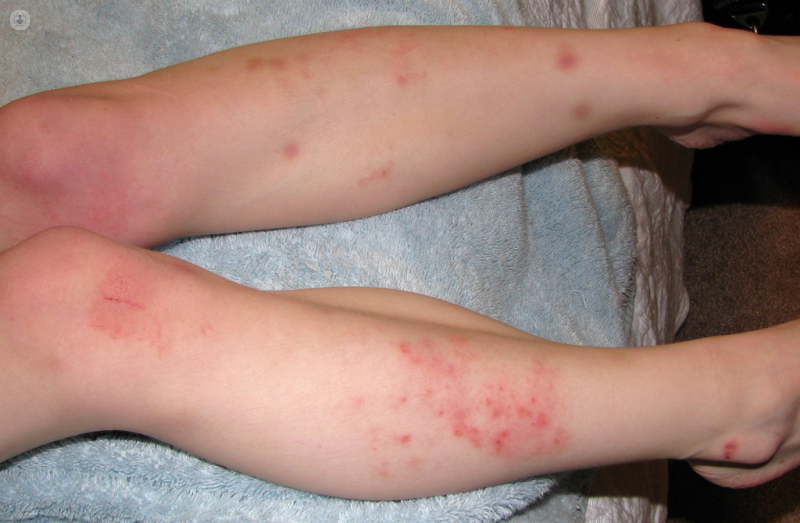Is there a link between eczema and food allergies?
Escrito por:Food allergies seem to have increased dramatically over the last few decades – for example peanut allergy cases have tripled in just over a decade and now almost one in 50 children in the English-speaking world are affected. Similarly, eczema seems to be in the rise. Could there be a connection? Paediatric allergist Dr Adam Fox is here to explain.

Types of food allergies
Food allergies can be divided into:
- Immediate allergies – the effects of an allergic reaction manifest quickly and are usually obvious, e.g. hives, wheezing, anaphylaxis. Since symptoms appear shortly after the food is ingested, they can be tested for. Common foods that trigger a reaction include milk, egg, peanuts, tree nuts, soy, wheat, fish and shellfish.
- Delayed allergies – reactions may occur hours after the food was consumed and involve a different part of the immune system. They are much more difficult to test for and diagnose as a result. Triggers are thought to include milk, egg, soya and wheat.
Eczema and immediate food allergies
There appears to be a close link between eczema and immediate food allergies. The majority of children who have visited my clinic with immediate food allergies either have eczema or had it during their first year of life. This suggests that eczema may be a factor in the development of the food allergy. There is currently a lot of scientific interest in this theory.
The age at which eczema first appears and its severity also appear to affect the probability of developing food allergies. For example, children with severe eczema that developed in their first six months of life have a much higher risk, and indeed most of these have a food allergy, while this whose eczema started after their first birthday are much less likely to develop one.
There is no real alternative to avoiding the food that triggers the reaction and being prepared to treat allergic reactions immediately should they occur. Thankfully, many children outgrow these allergies over the course of their childhood, particular allergies to milk and egg. More recently, we have started to offer desensitisation treatments for children with common food allergies to help reduce the risk of severe reactions.
Eczema and delayed food allergies
The idea that something a child eats regularly could be causing their eczema to get worse is still somewhat controversial, with some doctors dismissing the possibility. While it is almost certainly true that the majority of children with eczema won’t have a delayed food allergy, in certain children, identifying problem foods can improve their eczema considerably, helping to reduce reliance on steroid creams to control the condition.
Research into the connection between delayed food allergies and eczema suggests that, again, eczema that started early and is more severe is most likely to improve with dietary changes.
Diagnosing the connection
While tests like skin prick tests are good for diagnosing immediate allergies, they are of little use for delayed allergies. Instead, a thorough evaluation by a doctor or dietician, who will take a detailed medical history, is the only real way to reach a diagnosis.
There are certain clues a doctor will pick up on that can indicate a connection between eczema and food allergies:
- Family history of allergies, e.g. asthma, eczema
- Eczema first appeared at less than six months of age
- Conventional treatment such as steroid creams don’t work as well as expected
- The child shows gastrointestinal symptoms, e.g. reflux, diarrhoea, colic, poor weight gain
- Eczema worsens after meals
- The child already has one food allergy – it is worth considering if they might have another!
It is crucial to remember that food allergies and eczema are usually unrelated and it’s never a good idea to restrict what your child eats without good reason as it can deprive them of important nutrients. For this reason, if you suspect a food allergy may be causing their eczema, take them to see your family doctor or an allergist and follow their advice. If a diagnosis of food allergy is made, the child should have follow-up care to check if and when it is possible to reintroduce the food safely to their diet.


